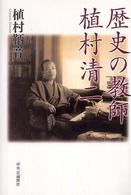- ホーム
- > 洋書
- > 英文書
- > Cinema / Film
Full Description
Theorists of the soundtrack have helped us understand how the voice and music in the cinema impact a spectator's experience. James Buhler and Hannah Lewis edit in-depth essays from many of film music's most influential scholars in order to explore fascinating issues around vococentrism, the voice in cinema, and music's role in the integrated soundtrack. The collection is divided into four sections. The first explores historical approaches to technology in the silent film, French cinema during the transition era, the films of the so-called New Hollywood, and the post-production sound business. The second investigates the practice of the singing voice in diverse repertories such as Bergman's films, Eighties teen films, and girls' voices in Brave and Frozen. The third considers the auteuristic voice of the soundtrack in works by Kurosawa, Weir, and others. A last section on narrative and vococentrism moves from The Martian and horror film to the importance of background music and the state of the soundtrack at the end of vococentrism.
Contributors: Julie Brown, James Buhler, Marcia Citron, Eric Dienstfrey, Erik Heine, Julie Hubbert, Hannah Lewis, Brooke McCorkle, Cari McDonnell, David Neumeyer, Nathan Platte, Katie Quanz, Jeff Smith, Janet Staiger, and Robynn Stilwell
Contents
CoverTitleCopyrightContentsAcknowledgmentsIntroduction: Voices in, of, and on the Cinema / James Buhler and Hannah LewisPart One: Historical Approaches to Technology and the Voice1. Apprehending Human Voice in the "Silent Cinema" / Julie Brown2. Silencing and Sounding the Voice in Transition-Era / Hannah Lewis3. FM Radio and the New Hollywood Soundtrack /Julie Hubbert4. Pinewood's Fiddler Fans Goldwyn's Folly: London's Battle for Postproduction Sound Business / Katherine QuanzPart Two: The Practice of the Singing Voice5. Vococentrism and Sound in Ingmar Bergman's The Magic Flute / Marcia J. Citron6. Breaking into Soundtrack in 1980s Teen Films / Cari McDonnell7. Girls' Voices, Boys' Stories, and Self-Determination in Animated Films since 2012 / Robynn J. StilwellPart Three: The "Auteuristic" Voice of the Soundtrack8. The Trouble with Onscreen Orchestrators: Progeny and Compositional Crisis in the Four Daughters Films / Nathan Platte9. Some Thoughts on Genre, the Vococentric Cinema, and "Stella by Starlight" / David Neumeyer10. Listening to Soundscapes in Kurosawa's Dersu Uzala (1975) / Brooke McCorkle11. Peter Weir and the Piano Concerto / Erik HeinePart Four: Narrative and Vococentrism12. Monocentrism, or Soundtracks in Space: Rediscovering Forbidden Planet's Multi-Speaker Release / Eric Dienstfrey13. Sound and the Comic/Horror Romance Film: Formula, Affect, and Inflection / Janet Staiger14. Once More into the Breach: Interrogating Ben Winters's Nondiegetic Fallacy / Jeff Smith15. The End(s) of Vococentrism / James BuhlerContributorsIndexBack cover








